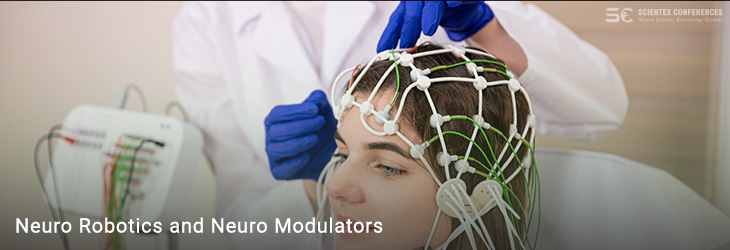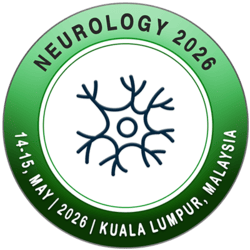Track: Neuro Robotics and Neuro Modulators

Session Overview:
In this cutting-edge session, we delve into the transformative fields of neuro-robotics and neuro-modulators, which are revolutionizing neurology and mental health treatments. We will explore how robotic-assisted surgeries enhance precision and safety, enabling improved outcomes and faster recovery for patients with neurological disorders. The session will also cover the latest advancements in brain-computer interfaces (BCIs), which offer innovative solutions for communication and control in individuals with severe disabilities. Additionally, we will examine recent developments in neuro-modulatory techniques such as deep brain stimulation (DBS) and transcranial magnetic stimulation (TMS), focusing on their applications in managing neurological and psychiatric conditions. By integrating these technologies, the session aims to showcase their combined potential to advance patient care, promote rehabilitation, and address complex clinical challenges. Attendees will gain insights into the future of these fields and their impact on clinical practices and research.
Recent Developments:
In the realm of neuro-robotics, recent advancements include sophisticated surgical robots that offer unprecedented precision through enhanced real-time imaging and autonomous functions, significantly improving outcomes in complex neurosurgical procedures. Brain-computer interfaces (BCIs) have seen major innovations with more intuitive control systems and adaptive algorithms that tailor to individual brain activity, making these devices more effective and user-friendly. Additionally, wearable neuro-robotic devices designed for neurorehabilitation are now incorporating flexible materials and AI-driven feedback mechanisms, aiding in motor recovery for patients with stroke and spinal cord injuries. In neuro-modulation, precision Deep Brain Stimulation (DBS) technology has evolved with adaptive stimulation systems that adjust based on real-time brain activity, providing enhanced therapeutic effects for movement disorders like Parkinson’s disease. Targeted drug delivery systems have emerged, allowing for precise administration of medications to specific brain regions, thus reducing side effects and improving efficacy for neurological and psychiatric conditions. Moreover, non-invasive Transcranial Magnetic Stimulation (TMS) has benefited from new protocols that target brain areas more accurately, leading to better outcomes for depression and other mental health disorders. These innovations collectively represent significant strides in enhancing patient care and advancing treatment methodologies.
Sub-Tracks:
Robotic-Assisted Neurosurgery
Focuses on advancements in robotic systems enhancing surgical precision and safety in neurosurgical procedures.
Brain-Computer Interfaces (BCIs)
Covers innovations in technology that enable direct communication between the brain and external devices for improved functionality in individuals with disabilities.
Neuro-Rehabilitation Robotics
Examines wearable robotic devices designed to aid motor recovery and rehabilitation for patients with neurological impairments.
Adaptive Deep Brain Stimulation (DBS)
Discusses developments in DBS systems that adjust stimulation parameters based on real-time brain activity for optimized therapeutic outcomes.
Targeted Neuro-Modulation
Explores methods for delivering drugs or stimuli precisely to specific brain regions to enhance treatment efficacy and minimize side effects.
Non-Invasive Transcranial Magnetic Stimulation (TMS)
Investigates new protocols and techniques in TMS for modulating brain activity to treat psychiatric and neurological disorders.
Neuro-Robotic Interfaces
Focuses on integrating robotics with neural interfaces to improve control and interaction between robotic systems and the human nervous system.
Closed-Loop Neuro-Stimulation Systems
Reviews systems that use real-time feedback to adjust stimulation based on neural responses for better therapeutic results.
Neuro-Engineering Innovations
Covers interdisciplinary advancements combining engineering and neuroscience to develop novel neuro-robotic and neuro-modulatory technologies.
Ethical and Regulatory Issues
Discusses the ethical considerations and regulatory challenges in the development and deployment of neuro-robotic and neuro-modulation technologies.
Scientific Highlights
- Neurology
- Neuro Anatomy
- Mental Health and Psychiatry
- Geriatric Neurological Disorders
- Neuromuscular Diseases
- Brain Tumor and Neuro-oncology
- Cerebrovascular and Critical Care Neurology
- Clinical Neurophysiology
- Central Nervous System
- Neuro-Ophthalmology
- Pediatric Neurology
- Neuroimaging and Brain Mapping
- Neurogenetics and Neurodegenerative Disease
- Behavioral and Cognitive Neuroscience
- Neurochemistry and Neuropharmacology
- Spinal Neurosurgery and Neural Transplantation
- Neuro Robotics and Neuro Modulators
- Addiction and Adult Psychology
- Brain Stimulation and Computational Neuroscience
- Neural Control of Micturition
- Parkinson's Disease


